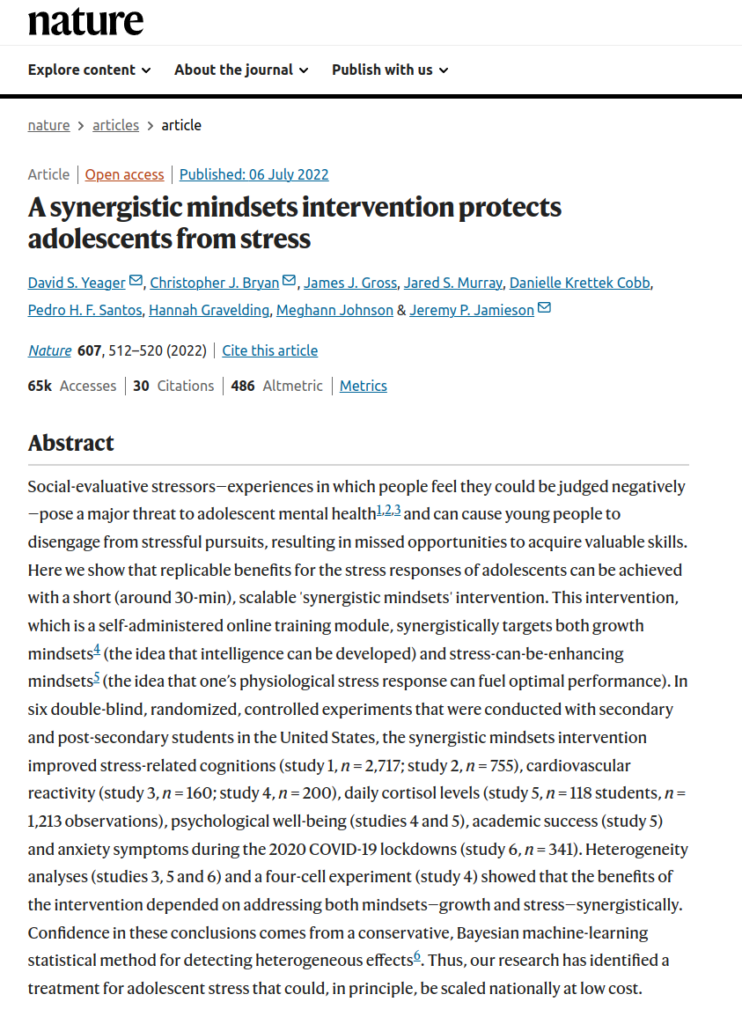Social-evaluative stressors—experiences in which people feel they could be judged negatively—pose a major threat to adolescent mental health1,2,3 and can cause young people to disengage from stressful pursuits, resulting in missed opportunities to acquire valuable skills. Here we show that replicable benefits for the stress responses of adolescents can be achieved with a short (around 30-min), scalable ‘synergistic mindsets’ intervention. This intervention, which is a self-administered online training module, synergistically targets both growth mindsets4 (the idea that intelligence can be developed) and stress-can-be-enhancing mindsets5 (the idea that one’s physiological stress response can fuel optimal performance). In six double-blind, randomized, controlled experiments that were conducted with secondary and post-secondary students in the United States, the synergistic mindsets intervention improved stress-related cognitions (study 1, n = 2,717; study 2, n = 755), cardiovascular reactivity (study 3, n = 160; study 4, n = 200), daily cortisol levels (study 5, n = 118 students, n = 1,213 observations), psychological well-being (studies 4 and 5), academic success (study 5) and anxiety symptoms during the 2020 COVID-19 lockdowns (study 6, n = 341). Heterogeneity analyses (studies 3, 5 and 6) and a four-cell experiment (study 4) showed that the benefits of the intervention depended on addressing both mindsets—growth and stress—synergistically. Confidence in these conclusions comes from a conservative, Bayesian machine-learning statistical method for detecting heterogeneous effects6. Thus, our research has identified a treatment for adolescent stress that could, in principle, be scaled nationally at low cost.
A synergistic mindsets intervention protects adolescents from stress
Abstract
Web and Email Links
Related Listings
Journal
The Clinical Journal of Pain
The treatment of chronic pain is costly and frustrating for the patient, health care provider, and health care system. This is due, in part, to the complexity of pain symptoms which are influenced by behavior patterns, socioeconomic factors, belief systems, and family dynamics as well as by physiological and mechanical components. Assessment of treatment outcomes is often limited to the patient's subjective, multidimensional, self-reports. Outcome measures based on data about return t […]
Journal
Calmer
In light of World Sleep Day this month, this week’s guest post features Valerie Teh, Calmer’s Client Manager and Self-Care Practitioner, who shares her expertise on how to explore and embrace intelligent rest to enhance quality sleep and nurture your overall wellbeing.
Journal
Behavioral Medicine
This article describes the validation of an Inventory of Positive Psychological Attitudes that has potential relevance to health outcomes and its preliminary testing with chronic pain patients. The inventory taps two attitudinal domains: (1) life purpose and satisfaction and (2) self-confidence during potentially stressful situations. It also provides a total score. The inventory scales, developed using factor analysis, were found to have a strong degree of internal reliability and co […]

